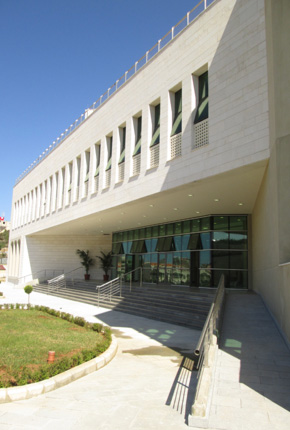Building an accessible campus
LAU creates a culture of respect for students with physical or learning disabilities.
When it comes to choosing where to go to university, there are many things students have to consider: is it the right course, what dorms to live in, is financial aid available? But for many young scholars, the most decisive factor will be whether a university is disabilities-friendly.
In Lebanon, where the rights of the disabled are routinely snubbed, LAU is striving to attract a diverse student body by making its campuses accessible and providing additional support for students with disabilities. It has seen a growing number of enrolled students with special needs. “By working to create an accessible learning environment, LAU aspires to promote a culture of respect for students with special needs and provide a university experience where those students are not unfairly disadvantaged,” says Dr. Mars Semaan, dean of students at LAU Byblos.
That’s admittedly no easy feat in a country where hospitals, schools, public transportation and employers regularly deny equal opportunities or access to those with disabilities. This is in spite of Law 220, issued in 2000, which grants people with physical disabilities equal rights and access to public places.
At LAU, most campus facilities are being or have already been upgraded for equal accessibility, “with Facilities Management incorporating ADA requirements in all renovation or new building work,” says Georges Hamouche, assistant vice president for Facilities Management, referring to the 1990 Americans with Disabilities Act (ADA), which prohibits discrimination against the disabled.
“When I was first accepted, I met with LAU administrators to discuss accessibility issues,” said Anthony Nahoul, a computer science major who uses a wheelchair. “LAU has built some facilities, such as ramps and lifts,” to buildings that were constructed before the ADA regulations came into force and grants extra exam time where deemed necessary. “I also have a parking spot of my choice. Some buildings aren’t accessible yet but LAU is working to ensure all facilities can be used by its entire student population.”
But according to Dr. Norma Mousally, clinical psychologist and senior counselor at the Beirut campus, addressing the rights of disabled students on campus does not only mean addressing accessibility or complying with ADA standards. It’s also about breaking through taboos, particularly towards disabilities invisible to the eye, such as ADHD (Attention Deficit Hyperactivity Disorder), learning disabilities or mental health illnesses.
“There has been a lot of progress in recent years but because taboos remain, many students don’t even want to tell their professors they have a learning disability,” she says. She urges students with suspected or diagnosed disabilities to visit her office in the Wadad Said Khoury Student Center to better determine how LAU can help.
“LAU has always been student-centered and so instructors are generally very understanding and cooperative about the needs of students with disabilities,” says Dr. Ahmad Oueini, associate professor at the Department of Education.
More
Latest Stories
- Quality of Life on Hold: Multiple Sclerosis Care During Lebanon’s Economic Crisis
- AKSOB Launches Three New Executive MBA Certificates
- Blending Coding Education With Career Exploration
- LAU Alumnus Helms Seminar on Entrepreneurship and Sustainability
- On Point Celebrates Student Innovation and Commitment to Accreditation
- LAU Kicks off the Seventh Season of the Jr. NBA League
- Bridging Policy, Science and Society to Tackle Lebanon’s Environmental Challenges
- Understanding a Core Security Gap in Drone Operations


